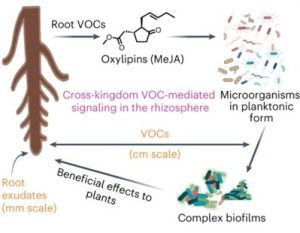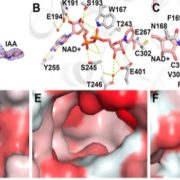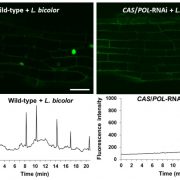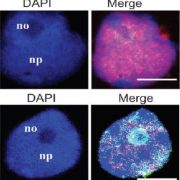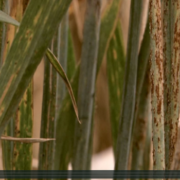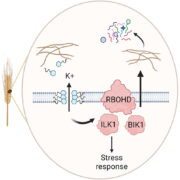Volatile methyl jasmonate from roots triggers host-beneficial soil microbiome biofilms
Volatile molecules released from plant roots (root VOCs, rVOCs) can diffuse over long distances, thereby increasing the sphere of plant influence. However, their influence on complex soil microbial communities (or microbiomes) and ecological implications are poorly understood, mainly due to technical challenges in capturing and quantifying rVOCs. To overcome these challenges, Kulkarni and Mazumder et al. developed an airflow system named the “push-pull system” to investigate how rVOCs affect biofilm formation in soil microbiomes. They established that rVOCs trigger lifestyle transition from planktonic to biofilm states in complex soil microbial communities. The authors showed that this phenomenon is evolutionarily conserved in plant kingdom, ranging from ferns to higher plants. By volatile profiling of biosynthetic mutant lines, they identified methyl jasmonate (MeJA) as the principal bioactive compound in rVOCs and established that MeJA acts at nanomolar concentrations as a signal responsible for increasing biofilm formation by soil microbiomes. The authors also showed that the MeJA-induced biofilms promote plant growth from a distance, through microbial volatile signaling. Thus, a volatile-mediated feedback loop was established between plant and complex soil microbial communities. This study (i) adds evidence to the emerging concept of ‘extended rhizosphere’, through volatile-mediated long-distance influence, and (ii) discovers a moonlighting role of jasmonate, where the host defense signal MeJA is co-opted by plant roots for assembling host-beneficial biofilms in the soil microbiome. (Summary by Arijit Mukherjee @ArijitM61745830) Nat. Chem. Biol. 10.1038/s41589-023-01462-8


